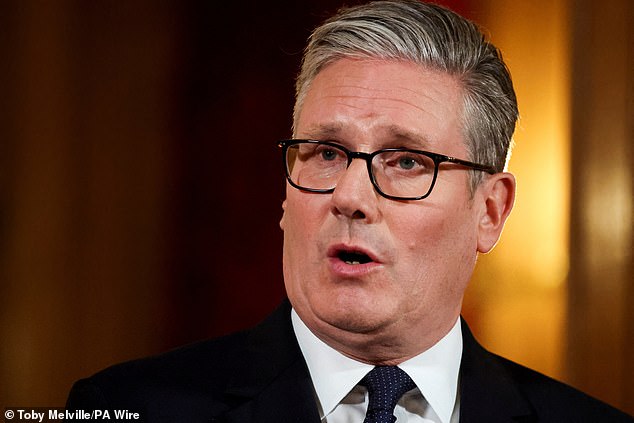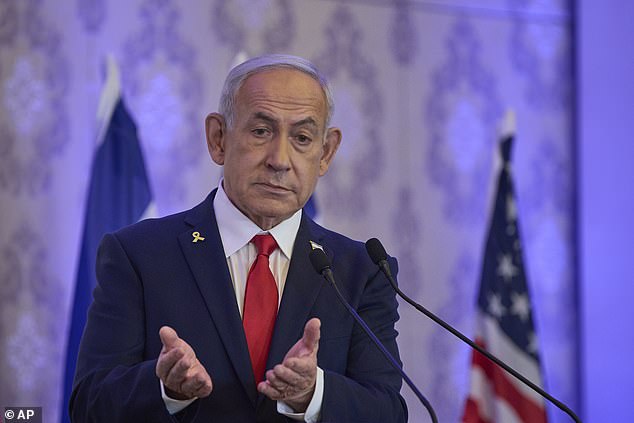A couple of weeks ago, a Cabinet minister contacted one of Keir Starmer‘s senior aides to ask about reports the Government was preparing to recognise a Palestinian state. ‘That’s not the plan,’ the minister was emphatically told. ‘We won’t be making any moves until September at the very earliest.’
Yesterday Keir Starmer announced Britain was preparing to recognise a Palestinian state. As one minister complained to me, the Prime Minister ‘simply cannot hold a line on anything’.
The condemnation over his announcement was swift – and united people across the political spectrum. ‘Palestinian statehood is not a bargaining chip. It is not a threat. It is an inalienable right of the Palestinian people. Our demands on this shameful Government remain the same: end all arms sales to Israel, impose widespread sanctions, and stop the genocide, now,’ raged Jeremy Corbyn.
Israeli premier Benjamin Netanyahu was outraged, saying: ‘Starmer rewards Hamas‘s monstrous terrorism and punishes its victims. A jihadist state on Israel’s border today will threaten Britain tomorrow.’
But the most damning verdict came from the British families of the hostages being held by Hamas. They said they were ‘deeply concerned that the UK’s approach risks disincentivising Hamas from releasing the hostages. This risks doing exactly what the Prime Minister’s statement says the UK will not do: reward Hamas for its heinous and illegal acts’.
Since the election, Keir Starmer has played the part of the international statesman at one jamboree after another. He has won plaudits in some quarters for his quiet and careful diplomacy. But yesterday’s statement is swiftly turning into his personal political and diplomatic disaster.
The reality is the Prime Minister panicked. And, I can reveal, he was effectively bounced into his announcement by a combination of domestic political pressure, lobbying from his colleagues and the manoeuvring of his supposed international allies.
The beginning of his latest catastrophic U-Turn came last week, with the publication of a letter signed by more than 130 Labour MPs demanding immediate recognition of Palestine. According to one minister: ‘It was the straw that broke the camel’s back. Cabinet ministers were privately encouraging people to sign it. Keir was told: “There’s no way we can hold the line any more.”‘

Yesterday Keir Starmer announced Britain was preparing to recognise a Palestinian state

Israeli premier Benjamin Netanyahu was outraged, saying: ‘Starmer rewards Hamas’s monstrous terrorism and punishes its victims.’

The Prime Minister’s pro-Palestinian critics believe he has not gone far or fast enough, writes Dan Hodges
A second minister told me, however, that the letter was in fact tacitly endorsed by No 10 itself. ‘MPs were privately told, “You’re pushing on an open door. Keir is moving this way, anyway,”‘ the minister said.
The second decisive moment came when Emmanuel Macron tweeted last week that France would unilaterally recognise Palestine. According to UK Government sources, the timing and nature of the announcement caught London off-guard. ‘It surprised them,’ I am told. ‘And in response they felt they had to move fast.’ This was evidenced by Keir Starmer’s sudden and unexpected emergency cabinet meeting on Tuesday to discuss recognition.
However, over the weekend, within No 10 there was still uncertainty about what a British statement of recognition would look like, I understand. According to another senior Government source, over the weekend the position shifted. Initially the plan was to place conditions on both Israel and Hamas. But by the time of Starmer’s announcement, the conditions on Hamas had been dropped. ‘The position changed between Friday and Monday,’ the source told me. ‘There was going to be stronger language on the [remaining Israeli] hostages [held by Hamas] – but it was removed.’
A second source told me: ‘On Friday, Keir had a settled position. But then he was ambushed by the Cabinet. They were the ones demanding the Cabinet meeting. They basically forced his hand.’
This ongoing uncertainty, I can now reveal, is partly why Starmer withheld outlining his plan to Donald Trump when they met in Scotland. Trump later said he was ‘surprised’ the Prime Minister had not informed him of the proposals, and tactfully criticised the policy for giving succour to Hamas. A Downing Street source insisted to me that ‘the conflict was raised more broadly’ during their meeting.
Starmer’s announcement also blindsided the Israeli government. According to one minister: ‘The first they heard about it was when Keir started speaking. David [Lammy] was supposed to have had a phone call to give them a heads-up, but for some reason it didn’t happen.’
Indeed some ministers tell me the Foreign Secretary was instrumental in convincing Starmer to make the policy shift altogether. ‘David’s been pushing on this for months,’ says one. ‘He sees it as being his major political legacy.’
A number of MPs and ministers view things very differently from Lammy. They see this as a grave diplomatic error and are still struggling to come to terms with the implications of the PM’s botched announcement. As one pointed out to me: ‘We used to have a clear, consistent and defensible position. Statehood, but only as part of a negotiated settlement and peace-process. Now he’s turned all that on its head.’
Quite so. Labour’s manifesto pledge was clear. It stated: ‘We are committed to recognising a Palestinian state as a contribution to a renewed peace process which results in a two-state solution with a safe and secure Israel alongside a viable and sovereign Palestinian state.’ Starmer’s decision to try to use Palestinian statehood as a device with which to threaten the Israeli government reneges on that position.
It’s true that many Labour MPs are relieved they now have something to offer the far-Left pro-Palestinian activists who are making their lives a daily nightmare. ‘I just need to be able to say: “Look. The Government’s not blind. We can see what’s happening in Gaza, and it’s appalling. But we’re acting,”‘ says one party figure.
But others see yet another major strategic blunder. ‘We keep caving. Or rather, he keeps caving. And this just can’t keep happening,’ complains one minister.
The biggest problem for Keir Starmer is that once again, in his efforts to appease everyone, he has satisfied no one. His pro-Palestinian critics believe he has not gone far or fast enough. Meanwhile, supporters of Israel see an even greater betrayal. In December, at the Labour Friends of Israel annual dinner, Keir Starmer told his audience: ‘After October 7, we stood by Israel. Today, we still stand with Israel’s right to defend herself against aggression.’ Empty words.
Now he has buckled to the pressure being exerted by his party’s pro-Palestinian opponents. Jeremy Corbyn has not yet named his own party, but he has already secured his first significant policy concession. And as the hostage families accurately point out, Hamas is now being rewarded for the atrocities it perpetrated on October 7.
From pensioner winter fuel payments to a statutory inquiry on grooming gangs and cuts to disability benefits, the U-turn is coming to be the defining feature of Keir Starmer’s Government. This latest capitulation is unlikely to be his last.












